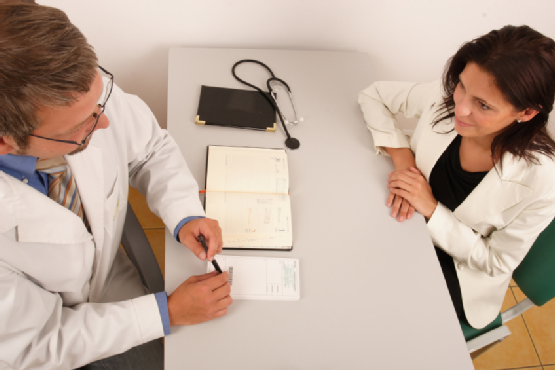-
Do Your Parents Have to Know You Take Birth Control Pills?

If you feel uncomfortable discussing sexual relations and birth control pills with your parents, you do not need to do so. Doctors, including gynecologists, are bound to a code of confidentiality. That means they will not inform your parents that you scheduled an appointment at a women’s health clinic, nor will they tell them that you’re starting to take birth control pills. Furthermore, you do not need to obtain the permission of your parents or guardian to take the pill.
During your appointment with the gynecologist, you’ll discuss your medical history and learn about your birth control options. Your gynecologist will ask you if you’re already sexually active; it’s important to be honest. If you’ve already had intercourse, your gynecologist may recommend an exam and testing for sexually transmitted diseases (STDs). Remember that taking the pill does not protect you from STDs; you’ll still need to use a condom.
At Washington Surgi-Clinic, our friendly gynecologists uphold the strictest standards of confidentiality for all of our patients. Young women throughout Maryland and Virginia can make an appointment to discuss birth control by calling (202) 659-9403.
-
The Difference Between a Pap Smear and Pelvic Exam
Women often confuse pelvic exams and pap smears as being the same procedure. However, they are two distinct wellness services. During a pelvic exam, the gynecologist examines the external genitalia and inserts a speculum into the vagina. The speculum enables the examination of the cervix. Then, the physician swabs the cervix to collect cells, which are examined in a lab. The pap smear is a screening tool, rather than a diagnostic test, to check for the presence of abnormal cells.
You can learn more about pelvic exams and pap smears by watching this video. This gynecologist discusses what will happen if abnormal cells and HPV infection are present, and what a physician may recommend if abnormal cells are present without an HPV infection.
Washington Surgi-Clinic is a fully equipped gynecology practice that provides women of the Maryland and Virginia areas with pap smears and a range of other women’s healthcare services . To schedule an affordable pap smear, call our office at (202) 659-9403.
-
Maintaining Your Birth Control Schedule While Visiting a Different Time Zone

If you’re making summer travel plans, birth control may be the last thing on your mind. In fact, many women forget to take the pill or use another method of birth control while on vacation, often because of jet lag or confusion over time zone differences. You can prevent an unintentional pregnancy by taking a few simple steps to maintain your birth control schedule. First, make an appointment with a gynecologist at a women’s clinic to discuss taking birth control while on vacation.
Visiting Your Gynecologist
If you have any confusion over how to maintain your birth control schedule while traveling, your gynecologist can help you. You’ll also need to visit your gynecologist if you’re taking the birth control injection, Depo-Provera, and need a shot before you depart. If you’re taking the pill, make sure you have enough to take with you.
Traveling with Birth Control
Keep your birth control pills in their original container while traveling. Pack them in your carry-on bag if you plan to fly, rather than in your checked baggage. Doing so will help you maintain your schedule even if your checked baggage is lost. While out sightseeing, keep your pills in your handbag to enable you to take one on time, rather than having to rush back to the hotel.
Knowing When to Take the Pill
Even though you’re traveling between time zones, your body is still accustomed to taking the pill at your usual time. Take the pill at the normal time, rather than the time indicated in your new time zone. For example, if you usually take the pill at 6 p.m. and your new time zone is three hours behind, you should take the pill at 3 p.m. Remind yourself to take the pill by setting an alarm.
Women throughout Washington, D.C., Maryland, and Virginia will find confidential, affordable women’s healthcare services at Washington Surgi-Clinic. Our gynecologists will be happy to help you learn about your birth control options and how to maintain your schedule while you’re travelling this summer. Give us a call today at (202) 659-9403 or visit us online to view the services available at our women’s clinic.
-
Understanding the Difference Between Emergency Contraception and Abortion

There has been plenty of controversy with regard to emergency contraception. It’s a common misconception that emergency contraception causes a chemical abortion because it’s taken after sex. In fact, emergency contraception and abortion work in different ways and are not the same. If your primary method of birth control has failed, you can go to a women’s health clinic or pharmacy to obtain emergency contraception. If you do not take emergency contraception and later become pregnant, you can make an appointment with a gynecologist for an abortion.
How Emergency Contraception Works
Scientific studies support the assertion that emergency contraception works by preventing pregnancy , rather than facilitating an abortion. Plan B, commonly referred to as “the morning after pill,” works by preventing ovulation. When the ovaries are prevented from releasing an egg, the egg cannot become fertilized. Additionally, if fertilization does occur, emergency contraception prevents the egg from implanting in the uterus—a critical step for pregnancy to occur. Many fertilized eggs never become implanted to the uterine wall due to natural causes. In fact, experts propose that up to half of all fertilized eggs simply pass out of the woman’s body instead of establishing pregnancy. Taking emergency contraception can help ensure that this will occur.
How Chemical Abortions Work
Chemical, or non-surgical, abortions are a safe, legal option for women who are less than six weeks pregnant. They are accomplished by taking a pill known as mifepristone, also sometimes called RU-486. This pill isn’t the same as emergency contraception because it works by terminating an established pregnancy, rather than preventing one. After taking the pill, the woman’s body rejects the pregnancy in a manner much like a miscarriage. The drug works by changing the uterine lining to prevent the egg from staying attached. Misoprostol is given along with mifepristone to encourage the uterus to contract to expel the pregnancy tissue.
The gynecologists of Washington Surgi-Clinic provide confidential women’s healthcare services at an affordable fee . Our women’s clinic offers safe surgical and non-surgical abortions, STD testing, and birth control, including emergency contraception. Those in Washington, D.C. and beyond can schedule an appointment by calling (202) 659-9403.
-
Good Candidates for Chemical Abortions

Women in need of pregnancy termination might be eligible for a chemical abortion if they are still within the first trimester of their pregnancies. Specifically, a chemical abortion is an option for women who have not yet surpassed six weeks of pregnancy. In contrast to a surgical abortion, which is performed entirely within an abortion clinic, a chemical abortion can be carried out within the patient’s home. The medication given to the patient leads to the cessation of the pregnancy. A chemical abortion also causes contractions so that the tissues of the uterus can leave the body. Women who suspect they may be pregnant should consult a gynecologist about their chemical abortion options as soon as possible, as more advanced pregnancies may require surgical abortions.
Do you have more questions about chemical abortions ? If so, call Washington Surgi-Clinic at (202) 659-9403 to speak with an associate at our women’s clinic. We provide both surgical and chemical abortions for eligible patients in the greater Virginia, Maryland, and Washington, D.C. regions.
-
Overcoming Myths about HPV
HPV is an acronym for human papillomavirus, a term that encompasses more than 100 different viruses. This video reports on common HPV misconceptions.
One of the biggest myths regarding HPV is that once a person contracts it, he or she will forever have to live with the virus. On the contrary, approximately nine in 10 people who have HPV will clear the virus through their own immune systems. Of those who do not, close supervision of the disease by a physician is highly recommended. Another HPV misconception is that only promiscuous individuals get it. However, because these viruses can pass from skin-to-skin contact, even people who refrain from intercourse can contract HPV.
Getting a Pap smear is the first step toward knowing whether you have HPV. To schedule an appointment, call Washington Surgi-Clinic in Washington, D.C. at (202) 659-9403.
-
Get the Facts about Gonorrhea

Gonorrhea is a sexually transmitted disease that men and women alike can get through multiple forms of sexual contact. As a result, it can spread quickly when individuals engage in unprotected sex with more than one partner. If a person with gonorrhea doesn’t know that she has it, she can unknowingly spread the disease even within a monogamous relationship. This is why protected sex and gynecological examinations are essential to avoiding and addressing this problem.
Transmission
Though vaginal sex is a common way for gonorrhea to spread from one person to another, it is far from the only method of transmission. Individuals who engage in anal sex can contract this disease as well. Those who refrain from intercourse, yet perform oral sex on a partner , might also get gonorrhea. As a result, this disease can develop not only in the rectum and genitals, but also the throat and mouth.
Symptoms
Many people with gonorrhea may not be aware that they have this disease, as a high number of STD sufferers are asymptomatic. Of those who do present symptoms, both women and men might experience unusual fluid secretion from the vagina or penis, respectively. Women might also notice spotting during times other than their normal menstrual cycles. Men can suffer from testicular discomfort. Uncomfortable urination is common in both genders as well.
Treatment
An annual gynecological examination can reveal the presence of gonorrhea in individuals who show no noticeable symptoms. If possible signs of this disease appear and you are sexually active, you should see a gynecologist as soon as possible. Antibiotics are available that can clear this disease from the body. Cessation of all sexual activities until all medications have been used as directed is also important for the prevention of gonorrhea transmission to other people.
Could you be at risk for gonorrhea? To find out , call Washington Surgi-Clinic at (202) 659-9403. Our capable and confidential gynecological services for residents of the greater Washington, D.C. area can help you stay on top of your reproductive health.
-
Comparing the Different Types of Birth Control Pills

Birth control pills can provide women with a range of benefits beyond preventing pregnancy. Many medications can help users enjoy better skin, reduce their risk of gynecological cancers, and experience more comfortable menstrual cycles. When used in combination with condoms, birth control pills can offer women safe, healthy, and comfortable sexual lives. Knowing the differences between birth control pills can help women select the type that is right for their individual preferences and needs.
Continuous-Cycle Pills
Women who find their menstrual cycles to be uncomfortable or inconvenient might want to look into getting continuous-cycle pills. This type of birth control prohibits tissue buildup in the uterus, which it would normally shed each month. With continuous-cycle pills, women can avoid unintended pregnancies and unwanted periods.
Combination Pills
Many women opt for combination pills, which are named for their hormone content. Progestin and estrogen are two hormones that play a pivotal role in reproductive health and pregnancy. Combination birth control pills introduce both hormones into the body, which together prevent ovulation. If a woman does not ovulate, she cannot become pregnant. Combination pills come in a variety of formulations. Some pills adjust the dosage of progestin and estrogen each week of a given month, while others provide a static stream of these hormones on a daily basis.
Progestin-Only Pills
Because combination pills come with a slight increased risk for blood clots, some women might prefer progestin-only pills. As with any other type of birth control pill, women who choose to take progestin-only pills must strictly adhere to the prescription recommendations. This means taking one pill each day at the same hour so that the body will not mistakenly ovulate and create the opportunity for conception. Women who wish to breastfeed their children might also consider progestin-only pills as an added form of birth control.
Are you considering your birth control pill options? Washington Surgi-Clinic provides birth control services, including patches, injections, and birth control pills. If you live in the Maryland, Virginia, or Washington, D.C. area, call us today at (202) 659-9403.
-
When a Pelvic Exam Is Needed to Begin Birth Control

Women generally expect to undergo a pelvic exam at a women’s health clinic before a gynecologist will prescribe birth control. However, such is not always the case these days. Under certain circumstances, a pelvic exam may not be needed. It’s best to consult your gynecologist to determine if you should have one or not. Before recommending a pelvic exam – or not – a gynecologist will ask you about your medical history. You should also discuss any symptoms you may have experienced.
For example, gynecologists generally recommend pelvic exams to girls and women who have noticed symptoms such as pelvic pain, abdominal pain, abnormal bleeding, or any type of abnormal vaginal discharge. Pelvic exams are also a good idea for those who think they may have been exposed to a sexually transmitted disease (STD).
At Washington Surgi-Clinic of Washington, D.C., you’ll find warm, caring professionals who take the time to learn about your unique medical concerns and birth control preferences. Women in the Maryland and Virginia areas can schedule an appointment at our women’s clinic by calling (202) 659-9403.
-
Starting the Birth Control Pill Following an Abortion

The gynecologist at your abortion clinic is likely to advise you to avoid sexual intercourse for one to three weeks following your abortion. This is necessary to give you time to heal and to reduce the risk of infection. However, since it is possible to become pregnant again right after your abortion, it’s a good idea to talk to the gynecologist about your birth control routine. If you decide to start taking birth control pills, your gynecologist can answer any questions you have about the medication.
When to Take the Pill
In previous years, women were advised to start taking the pill on the first Sunday after their period began or on the first day of their period. However, it’s now known that women can begin taking the pill at any time. Progestin-only pills and combination pills may both be taken immediately following an abortion. You might choose to start taking it that same day or the following day.
How to Take the Pill
For maximum effectiveness, gynecologists advise women to take the birth control pill at the same time each day. You can remind yourself to take your pill on time by associating it with another action. For example, place your pills by your toothbrush so you’ll remember to take one every morning. If you’re using a 28-day pill pack, take a pill each day without skipping days. If you’re using a 21-day pill pack, you’ll refrain from taking any pills for seven days before starting a new pill pack.
How to Take Precautions
After your abortion, your gynecologist is likely to prescribe antibiotics to reduce the risk of an infection. It’s important to take all of your antibiotics as prescribed; however, be aware that these drugs can lessen the effectiveness of birth control pills. Use condoms in addition to birth control pills while you’re taking antibiotics.
If you’re looking for a fully equipped gynecology office that offers safe options for abortion, look no further than Washington Surgi-Clinic . Our gynecologists are always happy to discuss your birth control options with you. Call our women’s clinic in Washington, D.C. at (202) 659-9403 and ask us about our other healthcare services, including Pap smears, HIV testing, and STD treatment.
Recent Posts
Popular Posts
categories
- Uncategorized
- STD
- Washington Surgi-Clinic
- Abortion
- Pregnancy
- Pap Smears
- Birth Control Options
- HPV
- Gynecologist
- Pregnancy Test
- Abortion Safety
- IUD
- Pregnancy Termination
- First Trimister
- Cervical Cancer
- Morning After Pill
- Birth Control Pills
- Chlamydia
- Birth Control Shot
- Gonorrhea
- STD Testing
- Birth Control Implant
- Pelvic Pain
- Birth Control Patch
- HIV
- HPV Vaccine
